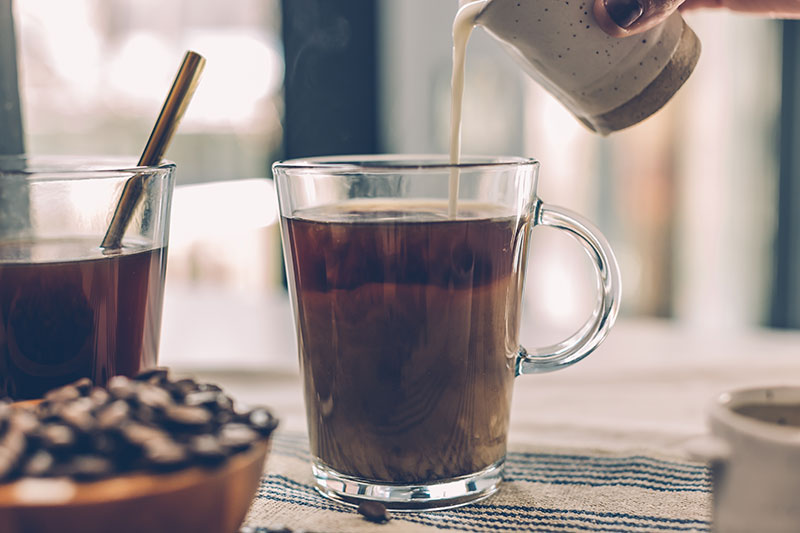Do you know that soul warming feeling you get from a hot cup of black tea with milk? And… Are you tired of it? Here are the best alternatives for those willing to experiment.
Which teas go well with milk?
Although, traditionally, only black tea is served with milk, experimenting with tea is not a bad thing anymore. Almost any full flavored, heavy or full-bodied tea will go well with milk. It’s best to choose roasted types or herbal teas with a sweet flavor. Any tea that has a light flavor should be avoided and left for pure spring water brewing instead. Therefore, Long Jing, Sencha or Silver Needle are not a good option as their flavor is too light and should be enjoyed on its own.

Dark roasted oolong teas
Dark roasted oolong go well with milk. Choose those that are stronger, and maybe even bitter if over-brewed. Dark roasted Dong Ding, dark charcoal roasted Tie Guan Yin, even Big Red Robe and Gui Fei could be good options for making a tea with milk. Steep loose leaf tea western style to make a stronger cup and just add a splash of milk.
Do not confuse “milky oolongs” with the actual tea with milk. Milky oolongs are a name for high mountain teas made from special jin xuan cultivar that have a light natural milky flavor.
Ripe Pu’erh tea
Although Pu’erh belongs to dark and not black teas, it can be made with milk. For making a Pu’erh tea with milk use dark ripe tea and brew for at least 5 minutes. Pu’erh is strong enough to handle more than only a drop of milk and a very good option for making a proper latte with extra ingredients as well.
Hojicha tea
Hojicha is a Japanese roasted green tea with a stronger flavor than regular green teas. There are many types of hojicha, and the best option would be a dark roasted one. Make a stronger brew than add a bit of milk. Besides, hojicha has very little caffeine so can be safely drank by children. Another great tea for blending with milk is Kyobancha, a type of Japanese bancha made in Kyoto, which is technically a hojicha as well.
Rooibos tea
This naturally sweet herbal tea made from African red bush is a perfect choice for making a tea with milk. Rooibos can be blended with many ingredients – from spices, chili, honey, chocolate and others, making it a good base for latte. IF you don't know where to start, check out our rooibos latte recipe.
Chamomile tea
Chamomile tea with milk? Chamomile’s natural sweetness goes well with a splash of milk. For a stronger flavor brew chamomile longer or use a bit more leaves.
Yellow tea
Although not every yellow tea goes well with milk, a special type called Huang Da Cha has a very strong flavor that blends well with milk. This tea is often called a “coffee among teas” because the flavor is very rich with notes of coffee and chocolate.
So, should you be adding milk to tea?
Even though some people say adding milk to tea is a real sin and would actually befriend you if doing so, how you like to drink your tea should be completely up to you. We do recommend trying every tea without milk first and try adding a few drops only to feel the difference. Some studies suggested that adding milk to tea might actually reduce the benefits of tea, but there is still not enough evidence to prove that[1]. However, if you drink tea purely for health benefits, you might want to restrain from adding milk.
Do you enjoy drinking tea with milk? What is the best combination you have tried so far?
[1] http://www.aicr.org/press/health-features/health-talk/2015/06-june/tea-milk-healthful-substances.html



Wow, I didn't know that there are kinds of Japanese tea that have milk in them. I might try to buy wholesale tea soon so that I always have a large stock at home whenever I'd like a cup. Trying out all sorts of milk tea at home would be a good way to shake things up and try out different aromas and flavors.